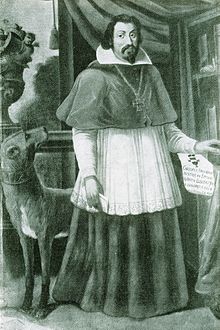Charles of Austria (1590–1624)
Archduke Karl of Austria called the Postume , also Karl Joseph of Austria (* August 7, 1590 in Graz , † December 27 or 28, 1624 in Madrid ) was Prince-Bishop of Breslau and Bishop of Brixen and Grand Master of the Teutonic Order . In 1621 his brother Ferdinand II gave him the county of Glatz as a fiefdom of the Crown of Bohemia .
Life
Karl's father was Archduke Karl II from the Styrian line of the Habsburgs , his mother was Maria of Bavaria , daughter of Duke Albrecht V , his brothers were Emperor Ferdinand II and Bishop Leopold of Strasbourg and Passau.
Since Karl was born only two months after the death of his father, he is also known as Karl the Postume . As a child he was destined for the clerical profession and received canons in Passau , Salzburg , Trient and Brixen . His upbringing and education was directed by the later Bishop of Seckau , Jakob I. Eberlein .
On July 7th, 1608 Archduke Charles was elected Bishop of Breslau . When he moved into the city on December 14, 1608, he was accompanied by the Lavant Bishop Georg Stobeus . Johann Jakob von Lamberg , Bishop of Gurk, was at his side in an advisory capacity as court master . In 1613 he was also postulated as the Bishop of Brixen, for whom an administrator was appointed, since Karl had chosen the Silesian Neisse as his permanent residence.
Charles could not be ordained priest until 1615 and episcopal ordination only in 1619, since he had not yet reached canonical age in the previous episcopal elections. Also in 1619 he became Grand Master of the Teutonic Order, succeeding his late cousin Archduke Maximilian .
The political and religious conditions that the devout Karl found when he took office in Breslau were not very pleasant. Emperor Rudolf II. , Also a cousin of Charles, had also issued a majesty letter to the Protestant princes and estates of Silesia in 1609 , in which the equality of religions was established, against which Karl protested in vain. In addition, the provincial governance for Silesia was not transferred to Karl as Bishop of Wroclaw, as was usual up to now, but to Duke Adam Wenzel von Teschen .
After the Silesians recognized the Protestant Elector Friedrich von der Pfalz after the outbreak of the Thirty Years War , Karl no longer felt safe in Neisse and fled first to his brother-in-law, the Polish King Sigismund Wasa , and then to his diocese of Brixen. After the Battle of the White Mountains he returned to Neisse, where he founded a Jesuit high school in 1622. On October 1, 1621, his brother Emperor Ferdinand II granted him the Bohemian County Glatz as a fiefdom of the Bohemian Crown, although at that time it was still on the side of the rebels and resisted the imperial troops. It was not conquered by the imperial family until October 28, 1622 and handed over by Karl to the new governor Philipp Rudolf von Liechtenstein-Kastelkorn in November 1622 , who accepted the tribute of the estates. As before in the Principality of Neisse , Karl initiated recatholicization in the County of Glatz. The Lutheran preachers and teachers were driven out, the nobility, cities and free judges were punished. The Protestants of the areas under his control only had the choice to emigrate or to become Catholic.

In 1624 Charles traveled to Madrid at the invitation of Philip IV , who intended to appoint him Viceroy of Portugal . After arriving in Madrid, he fell ill and died at the end of December that year.
His body was buried in Chapel IX of the Pantheon of the Infants in the Escorial Monastery , his heart - according to his request - by "separate burial" in a gold-plated capsule in the Neisser Jesuit Church, where it is buried every year on his name day , November 4th , during the Fair is exhibited.
literature
- Arno Herzig , Małgorzata Ruchniewicz : History of the Glatzer Land . Hamburg-Wrocław 2006, ISBN 3-934632-12-2 , pp. 124, 133 f., 138 and 157.
- Karl Kastner: Wroclaw Bishops. East German publishing company, Breslau 1929
- Matthias Schnettger: Karl [III.], Archduke of Austria. In: Biographisch-Bibliographisches Kirchenlexikon (BBKL). Volume 17, Bautz, Herzberg 2000, ISBN 3-88309-080-8 , Sp. 759-762.
- Berthold Sutter: Karl, Archduke of Austria. In: New German Biography (NDB). Volume 11, Duncker & Humblot, Berlin 1977, ISBN 3-428-00192-3 , p. 241 f. ( Digitized version ).
- Constantin von Wurzbach : Karl Joseph, Archduke of Austria, Grand German Master, Bishop of Breslau and Brixen . No. 142. In: Biographisches Lexikon des Kaiserthums Oesterreich . 6th part. Imperial and Royal Court and State Printing Office, Vienna 1860, p. 388 f. ( Digitized version ).
- Heinrich Ritter von Zeißberg : Karl Archduke of Austria . In: Allgemeine Deutsche Biographie (ADB). Volume 15, Duncker & Humblot, Leipzig 1882, pp. 315-318.
Web links
- Illustration from 1627: Carolus Archid. Austr. Dux ... ( digitized version )
- Bernhard Peter: Photos of beautiful old coats of arms: The episcopal castle in Bruneck in the Puster Valley with a detailed description of Charles' coat of arms
| predecessor | Office | successor |
|---|---|---|
| Johann VI. from Sitsch |
Prince-Bishop of Breslau 1608–1624 |
Karl Ferdinand Wasa |
| personal data | |
|---|---|
| SURNAME | Charles of Austria |
| ALTERNATIVE NAMES | Charles of Breslau and Brixen; Charles the Postume |
| BRIEF DESCRIPTION | Bishop of Brixen, Prince-Bishop of Wroclaw |
| DATE OF BIRTH | August 7, 1590 |
| PLACE OF BIRTH | Graz |
| DATE OF DEATH | December 28, 1624 |
| Place of death | Madrid |


